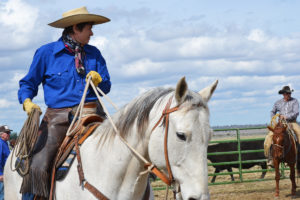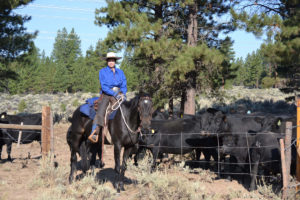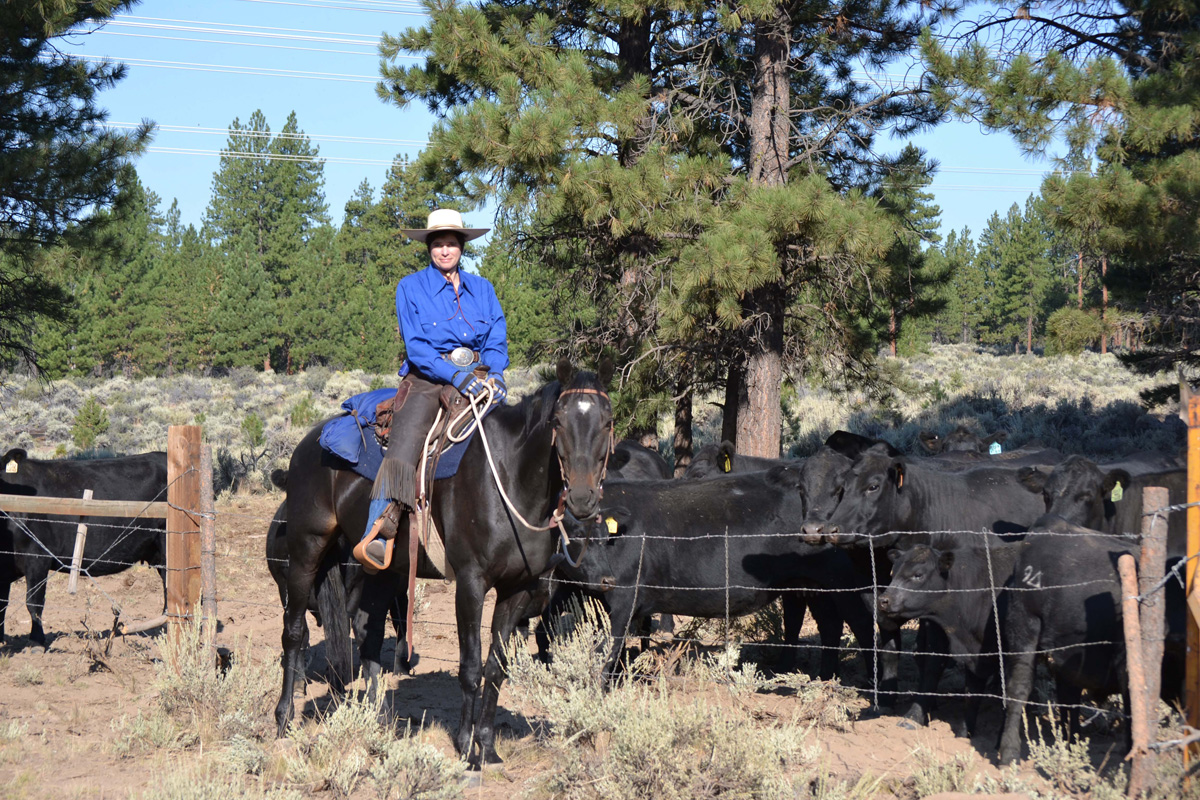by Laura Schonberg

Rebecca Borror owns, lives, and works at 9 Peaks Ranch, a cattle breeding outfit near Fort Rock, Oregon where daily operations depend on horses and their ability to work together. Coming from a background of competitive English and eventing disciplines, the relationship she now has with her horses focuses on communication, trust, and getting the job done.
Why I horse: Because I love it! Horsing gets me in touch with a part of me that is a good part of me. The interactions with my horses are more real than anywhere else in my world. Horses are not judgmental, and they always live in the moment. I love that they accept and acknowledge who I am, getting to the genuine parts of me. They’ll call me out on what I need to do better and help me if I’m trying to get on the right track.
Living on a ranch: Sometimes I have to go ride when it’s not that much fun to go ride. Sometimes the weather is awful up here—high winds, dust storms, snow, cold, rain, but something always needs to be done.
When there’s a deadline to get the cows off the forest land, they have to be moved. When hunting season starts, the herd has to go somewhere else. In the middle of summer, we’re gathering cows in an essential desert so we’ll start working at 4:30 a.m. That means you’re up at 3 a.m. and walking around in the dark to get ready and trailering where you need to be.
Then there are times when things are perfect and magical: gathering pairs on a misty morning when everything is going just right and a sunrise that takes your breath away — it’s hard to describe.
When I go to ride my horse, it’s usually to do a job. You don’t need a corral; just focusing on things a little bit at a time while working with a herd or moving pairs somewhere — there’s a context for the horse in being together and a reason to do what you’re asking. Trotting and circles and doing transitions in an arena used to be my whole life. Now it doesn’t mean much anymore.

What I look for: I like my horses to be a little busier and more mischievous than probably the average rider because I need my horse to work with me and be interested in what’s going on around them. Hopefully, it’s easy for them to fill in when I can’t quite get things done. A “busier” horse that has lots of try is going to look at things and figure out a way to get it done instead of walking up and saying, “Geez, I can’t do that!”
When we’re gathering cows in the forest, the horses can see and hear so much better than I can, and they’re constantly telling me about a deer, coyote, cow or where the other horses are. If you left me to find cows on my own, and even if I was in shape to run a marathon in sage brush all day, I would not find an eighth of the cows I can on horseback.
Something I’ve noticed: In being a ranch wife, strength is an asset, not something that’s considered frightening or overpowering or unfeminine. Society tells women that they should be resilient but shouldn’t be stepping in and volunteering and potentially taking away someone else’s opportunity. We also learn that we should never be pushy or loud or assertive. In context with horses, being able to step up and participate and get things done really gives a girl permission to explore a part of herself that’s unique. Horse women find a way around something if they’re not strong enough; whatever it takes to get things done.
Advice to others: Get the absolute best help you can even it means getting help less frequently. If you get mediocre help, it’s a struggle. The better the help, the less trouble you’ll get into and the faster you’ll learn.
Advice to myself: Give myself permission to do what I can with where my life is, and with what my horse is ready for or capable of doing. If I pressure myself to get something done (like getting ready for an upcoming clinic), I become dissatisfied with my horse which is silliness. If I can be with my horse exactly where the horse is at, we can go somewhere together.

Thankful to call the Pacific Northwest home, Laura Schonberg is an educator in a local school district and is outside at her place when she isn’t inside at work. Summers are spent cow-girling at a friend’s ranch, with forrays into the Cascade Mountains as time and weather permit year-round. Winter finds her at a local barn doing dressage lessons to support her ranch riding, and re-starting horses through the county’s equine rescue program.

